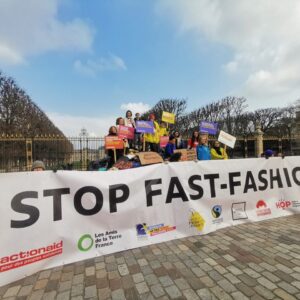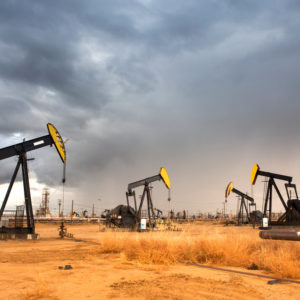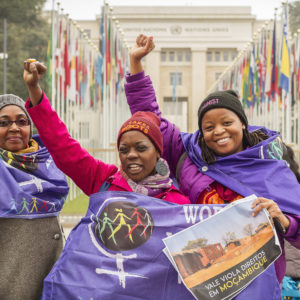Total’s Tilenga and EACOP projects: finally a court hearing in France on the merits of the duty of vigilance case
Tomorrow, Wednesday 7 December at 9:30am, a new hearing will be held at Paris civil court in the groundbreaking lawsuit against oil giant Total for serious breaches of its duty of vigilance regarding its oil mega-projects (Tilenga and EACOP) in Uganda and Tanzania.
Press release from Friends of the Earth France, Survie, AFIEGO, CRED, NAPE/Friends of the Earth Uganda and NAVODA
The case was filed in 2019 in France by six French and Ugandan organizations: Friends of the Earth France, Survie, AFIEGO, CRED, NAPE/Friends of the Earth Uganda and NAVODA. The core elements of the case will finally be examined, three years after the filing of this first ever lawsuit based on the pioneering French law on the duty of vigilance of transnational corporations, adopted in 2017.
What to expect from this hearing after three years of legal proceedings? This hearing follows the decision of the French Supreme Court last December after a two-year procedural battle, which confirmed that this case fell under the jurisdiction of the civil court and not the commercial court, thereby rejecting the arguments of Total’s lawyers. The Supreme court thus sent the case back in first instance before a civil court for a hearing that will finally get to the heart of the matter: Total’s failure to comply with its legal duty of vigilance.
For three years, the six organizations have been documenting and denouncing the numerous human rights violations and risks of irreversible environmental damage associated with Total’s oil mega-project, notably with field investigations first in Uganda, and more recently in Tanzania. The situation is urgent for local communities, who for several years have suffered from violations of their fundamental rights due to development of the Tilenga oil extraction project and the EACOP heated oil pipeline project by Total. Both projects are impacting the lands of approximately 118,000 people, who have been totally or partially deprived of their lands and livelihoods in Uganda and Tanzania for over 3 to 4 years now, and tens of thousands are still waiting for compensation.
In preparation for this hearing, the court summons have been updated with new testimonies and evidence of ongoing human rights violations. While the first oil drillings are imminent, the file has also been strengthened with respect to environmental and climate change aspects, thanks to new scientific studies and expert reports that highlight not only the major risks associated with these projects, but also the failure, or even non-existence, of measures taken by Total to address these risks.
In the conclusions of their summons, the six French and Ugandan organizations are asking the judges to order Total, subject to a financial penalty, to:
- bring its vigilance plan into compliance with the law by including all the risks of serious harms associated with the Tilenga and EACOP projects, as well as the appropriate vigilance measures to be developed to address these risks;
- effectively implement these vigilance measures, including emergency measures such as immediate payment of compensation and food support for communities deprived of their livelihoods.
« We have been fighting this legal battle against Total for over three years already. In Uganda and Tanzania, the situation is only getting worse for local communities, who for years have been suffering violations of their fundamental rights and land grabbing linked to the development of Total’s oil mega-project. »
« We finally have the opportunity to get to the heart of the matter in court and hold this transnational corporation accountable for its actions”.
The upcoming court decision goes beyond the already numerous issues at stake in this single case. This is the very first case based on the French law on the duty of vigilance of transnational corporations. The court ruling will therefore lay the foundations for the jurisprudence of this pioneering law in the world, for the defense of human rights and the environment. The decision could also fuel debates on the binding regulation of transnational corporations’ activities in Europe and at the global (UN) level, where legislation is currently being drafted.
“The French duty of vigilance law, despite its shortcomings, has the power to compel Total to stop human rights violations caused by its activities and to take concrete measures to prevent future major risks. We hope that the upcoming decision on the merits will be consistent with this and that the judges will appreciate the urgency of the matter”.
The date of the ruling will be announced by judges at the end of the hearing.
Notes to editors :
The French duty of vigilance law introduced new legal duties for large French transnational companies, to identify and prevent the risks of serious violations of human rights, health and safety of people, and the environment, caused by their own activities and those of their subsidiaries, as well as those of their main suppliers and subcontractors, both in France and abroad. These measures must be published annually in a vigilance plan, and effectively implemented. In October 2019, six French and Ugandan organizations sued Total for serious breaches of its duty of vigilance related to its Tilenga project (oil extraction in the heart of a natural protected area) and EACOP (giant heated oil pipeline) project, under development in Uganda and Tanzania.

















